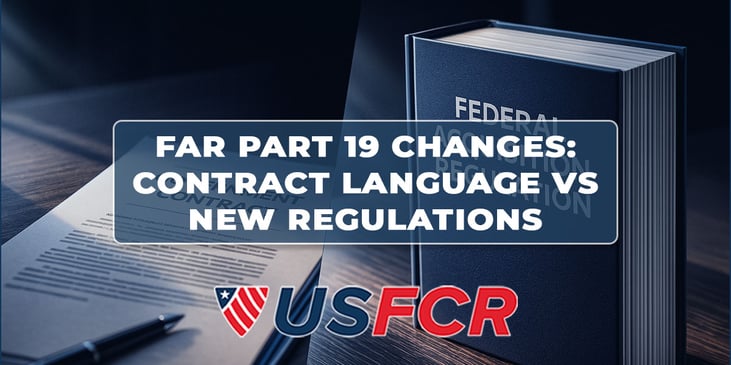You're sitting on a solid IDIQ contract awarded two years ago. Your company's grown since then (congratulations, by the way). Now you're looking at a task order under that same contract, and you're wondering: do the new FAR Part 19 recertification rules apply to you? Or does your original contract language protect your small business status through the life of the IDIQ?
Here's the truth that keeps experienced contractors up at night: the answer isn't as simple as "contract wins" or "regulation wins." It's both, depending on what's actually changing and how the rules interact.
What Changed in FAR Part 19 (September 2025)
The FAR Council released a major overhaul of FAR Part 19 in September 2025. The biggest change for IDIQ holders? Order-level recertification is mostly gone.
Here's what actually happened:
Size status now locks at the master contract level. Agencies get small business credit based on your status when the IDIQ was awarded, not when each task order comes out. Contracting officers can't just require you to recertify your size every time you compete for a new order.
But (and this is important): The FAR still requires recertification for specific contract events like mergers, acquisitions, novations, or exercising options on long-term contracts.
This sounds great for companies that have grown past size standards since winning their IDIQ. And it might be, temporarily. But there's a massive complication nobody's talking about enough.
The SBA Regulations Haven't Caught Up
Here's where contractors get into trouble. FAR Part 19 says one thing (size locked at master contract, limited recertification). But SBA regulations (13 C.F.R. § 125.12 and § 121.404) still allow contracting officers to request size or status recertification at the order level.
Read that again. The FAR says COs generally shouldn't require order-level recertification. The SBA regulations say they can.
When federal regulations conflict, you're in gray area territory. And gray areas in federal contracting usually resolve against the contractor, not in your favor.
Contract Language vs. Regulatory Updates: The Hierarchy
Let's talk about the actual legal hierarchy, because this determines what happens when your contract says one thing and current regulations say another.
Contract language governs the specific agreement. When you signed that IDIQ, you agreed to specific terms. Those terms don't automatically update every time the FAR changes. This is contract law 101.
But regulatory requirements still apply. Even if your contract doesn't specifically mention a regulation, you're still bound by applicable federal law and regulations. Contracts can't override statutory requirements or regulations that have the force of law.
This creates the conflict: Your IDIQ contract from 2023 might reference the old FAR Part 19 language about order-level recertification. The September 2025 FAR update changes those rules. But the SBA regulations (which have been around longer and haven't changed) still permit order-level recertification.
Which one wins? It depends on what you're actually trying to do.
"The FAR says contracting officers shouldn't require routine order-level recertification. SBA regulations say they can. When regulations conflict, contractors are in gray area territory that usually doesn't resolve in their favor."
Share on 𝕏The Real-World Scenarios
Scenario 1: You're competing for a task order, and the solicitation doesn't mention recertification
If your IDIQ was awarded before the September 2025 FAR changes, and the task order solicitation is silent on recertification, you might argue you should be evaluated under your original IDIQ status. The new FAR supports this position because it eliminates routine order-level recertification.
But, a recent case (Radiance Technologies, 2024) showed that even when solicitations don't explicitly require recertification, contracting officers have discretion to require it if the SBA regulations permit it. The GAO sided with the agency, not the contractor.
Scenario 2: The task order explicitly requires recertification
You're bound by the solicitation requirements. If the task order says "recertify your size status," you have to do it. Your original IDIQ contract terms don't override a new requirement in a specific task order competition.
SBA's Office of Hearings and Appeals has consistently held that when task orders are restricted to small businesses, there's often an implicit recertification requirement even if it's not spelled out explicitly. This happened in multiple cases (22nd Century Technologies 2021, Avenge 2023).
Scenario 3: You were acquired or merged since the IDIQ award
This one's clear-cut. Both the FAR and SBA regulations require recertification after mergers, acquisitions, or novations. Your contract language doesn't protect you here. The regulatory requirement is explicit and applies regardless of what your original IDIQ says.
If you recertify as "other than small," here's what happens under current SBA proposed rules: you lose eligibility for future set-aside task orders under that MAC, even though you're still an IDIQ holder. This is a significant change from how it used to work.
When You Can Leverage New Regulatory Language
So, when can you actually use the new FAR Part 19 changes to your advantage?
You can push back on routine recertification requests. If a contracting officer tries to require size recertification for every task order without a specific trigger event (merger, acquisition, or option exercise), the new FAR supports your position that this isn't required anymore.
You can cite the FAR's intent. The September 2025 FAR rewrite specifically noted that eliminating routine order-level recertification was designed to reduce administrative burden and provide more certainty for IDIQ holders. This legislative intent matters in disputes.
But approach this carefully. You don't want to be the test case that determines how these conflicts resolve. Here's how to think about risk:
The Strategic Timing Question
This is where experience matters. When should you cite the new FAR rules, and when should you just comply with whatever the contracting officer requests?
Low-risk situation to push back: Task order under an unrestricted MAC where recertification isn't mentioned in the solicitation, you're still small under your NAICS code, and you're just trying to avoid paperwork burden. Citing the new FAR rules here is reasonable.
High-risk situation to push back: Task order under a restricted small business MAC, your company has been acquired since the IDIQ award, and you're trying to argue you don't need to recertify. This is almost certainly going to end badly. The SBA regulations are clear on this one.
The middle ground: Task order where the solicitation mentions recertification but doesn't clearly require it, and you haven't had any major company changes since the IDIQ award. This is where you need legal counsel reviewing the specific language before you decide whether to challenge it or comply.
"Contract language doesn't automatically override new regulatory requirements. And new regulatory requirements don't automatically override existing contract terms. It's both, simultaneously, in ways that depend on what specifically you're trying to do."
Share on 𝕏What to Do Right Now
If you're holding IDIQs and wondering how these changes affect you, here's your action plan:
First, review your existing IDIQ contracts. What do they actually say about size recertification? Some contracts have specific clauses that require recertification at the order level. If yours does, that contract language still governs until the contract is modified or expires.
Second, document your current size status. If you've grown past your size standard since your IDIQ was awarded, don't assume the new FAR rules protect you indefinitely. The SBA regulations haven't changed, and they still permit order-level recertification.
Third, talk to your contracting officers. Not to argue about regulations, but to understand their interpretation of the new FAR rules. Some agencies are still figuring out how to implement the September 2025 changes. If you can have a collaborative conversation early, you avoid surprises when task orders come out.
Fourth, watch for solicitation language carefully. When task order solicitations come out under your IDIQs, read the small business requirements section thoroughly. If recertification is required, comply. If it's ambiguous, that's when you evaluate whether to seek clarification or legal guidance.
Fifth, plan for M&A implications. If you're considering selling your company or being acquired, understand that both FAR and SBA regulations will require recertification. This affects your eligibility for future task orders and can impact your company's value in a sale.
The Bottom Line
Contract language doesn't automatically override new regulatory requirements. And new regulatory requirements don't automatically override existing contract terms. It's both, simultaneously, in ways that depend on what specifically you're trying to do and what the regulations actually govern.
The September 2025 FAR Part 19 changes help in some situations. They don't help in others. And in some situations, there's genuine uncertainty about how conflicts between the FAR and SBA regulations will be resolved.
Here's what we know with high confidence: If you've been acquired or merged since your IDIQ award, you need to recertify, and it will likely affect your eligibility for future set-aside task orders. If you're competing for a task order that explicitly requires recertification, you need to do it regardless of what the FAR now says about routine recertification.
Everything else requires analyzing your specific contract, the specific task order solicitation, and the specific circumstances of your company.
USFCR has helped over 300,000 businesses position for federal contracting success. Our clients have won over $1.5 billion in federal contracts, and we navigate these regulatory complexities every day. If you're looking at task orders under existing IDIQs and wondering how these new rules affect you specifically, talk to a USFCR Registration & Contracting Specialist about your situation.
Speak to a USFCR Registration & Contracting Specialist →

Frequently Asked Questions
Does the September 2025 FAR Part 19 rewrite automatically update my existing IDIQ contract?
No. The FAR changes generally apply to contracts and orders awarded after the effective date. Your existing IDIQ contract terms remain in effect unless the contract is modified. However, new task orders under that IDIQ might be subject to the new FAR rules depending on agency implementation.
If I'm no longer small under my size standard, am I automatically disqualified from task orders?
Not automatically. Under the new FAR rules, your size is generally locked at the master contract level unless a specific event triggers recertification (merger, acquisition, or option exercise). However, SBA regulations still permit contracting officers to request recertification, creating uncertainty.
Can I protest a task order requirement to recertify my size status?
It depends. The new FAR says the decision to set aside or not set aside a task order under a multiple-award contract is discretionary and cannot be the basis for a protest. However, if recertification requirements are applied inconsistently or incorrectly, that might be protestable under different grounds.
What happens if I recertify as "other than small" after a merger?
Under the current SBA proposed rules, you would lose eligibility for future set-aside task orders under restricted MACs. You could still compete for unrestricted task orders where small business status isn't required. This is a significant change from how the rules worked before 2020.
Should I wait for the SBA to clarify its regulations before making decisions?
You can't afford to wait. Task order competitions happen now, not when SBA eventually updates its regulations. Make decisions based on current rules while understanding there's regulatory uncertainty. When in doubt, consult legal counsel for your specific situation.
Disclaimer: Based on information current as of November 2025 from official .gov sources, including acquisition.gov and SBA.gov. Federal contracting regulations change frequently. Confirm current details with your contracting officer or legal counsel for specific contract situations. This is general guidance, not legal advice for your particular circumstances.
All claims verified with official sources: FAR Part 19 (acquisition.gov, September 2025), PilieroMazza analysis (October 2025), Holland & Knight analysis (September 2025), GAO decision Radiance Technologies B-422615 (2024).
Top Articles
The 17 Most Common Types of Government Contracts Explained
Writing a Winning Capabilities Statement in 2025



